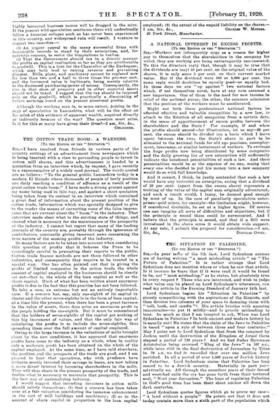Sns,—In your hist() of the 7th inst. Lord Sydenham accuses
me of having written " a most misleading article" on " The Future of Palestine." It is rather strange that Lord Sydenham does not mention where or when he saw that article. Is it because he fears that if it were read it would be found to be, not " most misleading," as he states, but absolutely true in every respect ? Those who are interested, and wish to judge what value can be placed on Lord Sydenham's utterances, can read my article in the Evening Standard of January 14th last.
Lord Sydenham begins his "Situation in Palestine " by piously sympathizing with the aspirations of the Zionists, and then devotes two columns of your space to damning them with " bell, book, and candle "I His article bristles with amazing inaccuracies—to put it mildly—and is grossly misleading to boot. So much so that I am tempted to ask, When was Lord Sydenham in Palestine ? In both ancient and modern history he is equally out l He states that the claim of the Jews to Palestine is based " upon a rule of between three and four centuries." May I point out to Lord Sydenham that from the conquest by Joshua until the destruction of the Kingdom of Israel there elapsed a period of 730 years ? And we find Judas Hyrcanus Aristobulus being crowned "King of the Jews " in 107 B.C., while later still in the final destruction of Jerusalem by Titus in 70 A.D. we find it recorded that over one million Jews perished. In all a period of over 1,500 years of Jewish history in Palestine. Lord Sydenham states that Palestine has long ceased to be a Jewish country. Materially in part yes— spiritually no. All through the countless years of their forced and wretched exile the cry has gone forth from their tortured soul, " Next year Jerusalem." The hope of regaining Palestine in God's good time has been their sheet anchor all down the dark centuries.
Lord Sydenham quotes figures which go to prove my case- " A land without a people." He points out that it does not to-day contain more than a sixth part of the population which
(I maintain) it can support when it is brought under proper cultivation.
Lord Sydenham is really amusing when he goes on to state: "Religious sentiment of incalculable force thus combines with racial condition, to oppose the projects of the Zionists." What a smug, self-satisfied race are the English! The Moslem will take kindly to the idea of the British having charge of Jerusalem, but he will be driven into fanatical fury if by chance the Jew—his own cousin—rule there once again! What a wonderful people we are and how everybody loves us
Again, Lord Sydenham states that I " commanded one of the two Jewish battalions raised during the war." Lord Sydenham may be interested to know that I commanded two Jewish battalions in the force known officially as Patterson's Column during the Jordan Valley and Gilead operations in September. 1918, that a third Jewish battalion was in Egypt and a fourth in England training. At the close of the war there were over 5,000 Jewish soldiers serving in Jewish battalions in Palestine.
With reference to the terms Arab and Beduin, I can assure Lord Sydenham that I have often spoken to the natives of Palestine during my stay there. They seemed proud of the fact that they were Beduin or Arabs, and were addressed as such. Never by any chance did one of them suggest he was a Syrian. I doubt if many of them would understand the word " Syrian." This is a word much affected by the absentee Effendi, and apparently Lord Sydenham has been gulled (by some interested party) into believing that the Beduin has become a good Syrian patriot!
Lord Sydenham has saddled me with the theory "that the Jews are to come into Palestine as capitalists in order to acquire the land of the people." I hold no such theory, and no one with any fairness could possibly put such a construction on my article. The Jews must settle and work on the land. There is much land now unoccupied waiting for development, but if more is needed there will be no difficulty in buying from the Beduin; he will gladly sell at a profit, and care not at all whether the buyer be Jew or Gentile. The Administration will of course see that he is justly treated. Many of the richest parts of Palestine are now owned by absentee landlords, whose policy it is to raise all the trouble they can in that country, and it is such men as those that Lord Sydenham is bolstering up.
I looked in vain for any sign of resentment when the solemn declaration was made by the British Government to the Jewish people. Now, according to Lord Sydenham, " wide- spread resentment has been caused by indications that the establishment of a Jewish State is contemplated," &c. Our ancient bureaucrats ever did try to make our flesh creep, by calling spirits from the vasty deep! A Jewish State is not possible for a score of years at least, so let slipshod political writers sleep comfortably in their beds in the meanwhile!
Lord Sydenham asks for " a plain declaration of policy." This was given in the Balfour Declaration—a solemn promise to the Jewish people from the British Government. Apparently Lord Sydenham would now treat this as a mere "scrap of paper." I hold no brief for the Jews; they are a people well able to take care of themselves; but the honour of England is pledged here, and I refuse to believe that anything so dastardly as a repudiation of the Balfour Declaration is contemplated by His Majesty's Government.—I am, Sir, &c.,
J. H. PATTERSON.



































 Previous page
Previous page